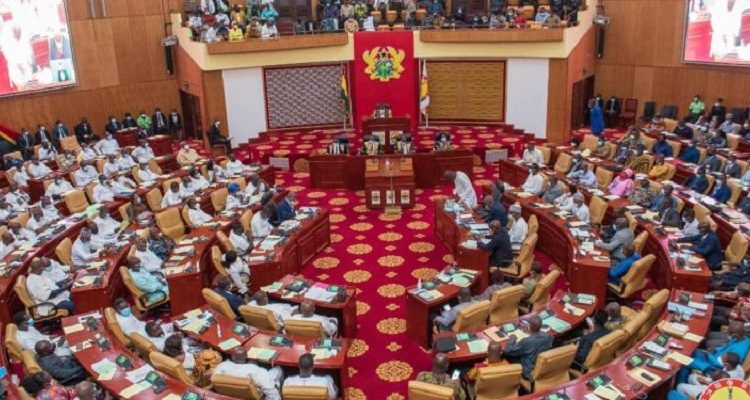The floor of Parliament
Parliament has taken steps to holistically review the current Standing Orders which has been in operation since 2000.
It comes in response to a growing public demand for transparency and accountability, as well as a desire for Parliament to increase its oversight of the executive and other constitutional bodies.
Speaking to the Standing Orders Committee’s report on the review of the Standing Orders, MPs stated that Parliament, as a representative of the people, is thus obligated to respond to the call by adopting new rules to provide structural and procedural arrangements to deliver on its mandate effectively and efficiently.
Article 110(1) of the Constitution of the Republic of Ghana, 1992 provides that “subject to the provisions of this Constitution, Parliament may, by standing orders, regulate its own procedure”.
The First Parliament of the Fourth Republic developed and adopted the Standing Orders of the Parliament of Ghana which regulated the proceedings of the House and its Committees, as well as, the privileges and immunities of the House and Members until its revision in November 2000.
According to the MPs, the expansion in the frontiers of democracy and good governance worldwide, coupled with changing trends in legislative practices and procedures, have necessitated a holistic revision of the current Standing Orders.
Previous Parliaments began the process of reviewing the Standing Orders to correct structural and procedural inadequacies in the current Orders in response to increased public demand on Parliament to effectively carry out its constitutional duties.
“Unfortunately, these Parliaments were unable to complete the review process before the expiration of their respective terms,” the report of the committee noted.
Following the inauguration of the Eighth Parliament, Speaker Alban Bagbin, with the Leadership of Parliament, formed a Technical Committee to study the Draft Orders and present a report to the Standing Orders Committee, the report added.
“Among other things, the Committee was tasked to complete the work commenced by preceding Parliaments. The Technical Committee undertook a comprehensive review of the Draft Orders and has had several meetings to report to the Standing Orders Committee.
“The review of the Standing Orders coincided with the review of the existing Strategic Plan (2020-2024) of Parliament which came into operation in January 2020,” the report noted.
The report pointed out that the provisions are thus consistent with Parliament’s efforts to achieve the medium-term goals, which include improving Parliament’s ability to exercise legislative power, enhancing Parliament’s oversight and accountability role, and enhancing Parliament’s capacity and productivity to effectively respond to changing trends in democratic governance.
“Having reviewed the work of the Technical Committee within the framework of the Corporate Strategic Plan (2020-2024) of Parliament, the Standing Orders Committee, is pleased to present to the House its report on the review of the Standing Orders,” the report said.
Key Subject Matters
The proposals and recommendations in the reviewed document incline improving the language on the existing text and the introduction of new and essential provision on varied subject matters.
They include interpretation, role of the Speaker, Order of Precedence of principal functionaries in Parliament, matters relating to court process and arrest, sanctions for contempt of Parliament or breach of Parliamentary privilege, and role of the Clerk to Parliament.
The rest are summoning of Parliament and suspension of Meeting, attendance of Members of Parliament, leave of absence, Official Communication to and from Parliament, Order of Business, backbenchers’ time, quorum of the House, voting in the House, procedure for secret voting, address by the President, and Parliamentary Questions.
The others are presentation of papers, admissibility of Motions and Half-Hour Motions, audience to heads of independent constitutional bodies, vote of censure on the Minister (cf. article 82 of the Constitution), disorderly conduct, voting in Parliament, disclosure of interest, fiscal impact analysis in respect of a bill, short explanatory statement on a bill, winnowing, and consideration stage of bills—incorporation of amendments prior to Third Reading.
The remaining ones are Authentication and Certification of Bills, Private Member’s Bill and Private Member’s Motion, and strengthening the Committee system of Parliament.
By Ernest Kofi Adu, Parliament House


